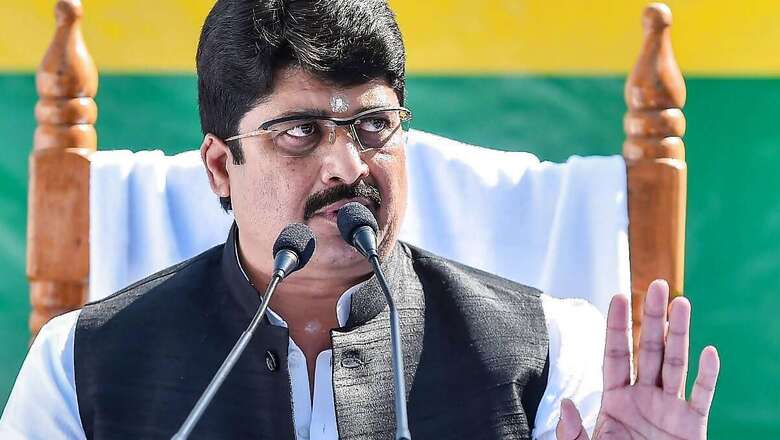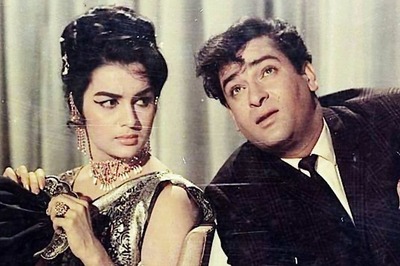
views
With the Lok Sabha polls in Uttar Pradesh and across the country nearing their final stages, the battle between parties and contestants is growing fiercer. At a time like this, the seemingly changed political stances of two strongmen of UP politics assume importance, especially when it comes to Pratapgarh and Jaunpur, two Lok Sabha seats that will have voting in the sixth phase of the polls on May 25. However, some analysts call it “Thakur politics” more than anything else.
Ahead of the fifth phase of the polls held on May 20, the announcement by Kunda MLA and Jansatta Dal (Loktantrik) chief Raghuraj Pratap Singh, popularly known as Raja Bhaiya, of maintaining a neutral stance stirred up the state’s political landscape. Advising his supporters to vote as they saw fit, Singh refrained from endorsing any specific candidate or party, a surprising move given his recent meeting with union home minister Amit Shah in Bengaluru, which had led to speculation about his potential support for the Bharatiya Janata Party. Singh’s absence from Shah’s stage during the Kunda rally and his non-commitment to the BJP were unexpected, say observers.
The Jansatta Dal (Loktantrik) has not fielded any candidates in the Lok Sabha elections, yet Raghuraj Pratap Singh’s influence, particularly in Pratapgarh where polling will take place on May 25, remains significant. The prominent Thakur leader of Poorvanchal has been continuously elected as MLA from the Kunda seat since 1993, underscoring his deep-rooted sway and the necessity for any political party to consider his position and following in the region.
Singh in fact launched a scathing attack on union minister Anupriya Patel over her last week’s “Raja-Rani” remark, stating that it’s Jan Sevaks (public servants) and not Rajas (kings) who are born from electronic voting machines (EVMs).
“Kings and queens have ceased to be born. Na raja rahe, na rajwade rahe; desh ko azad huye 70 saal se upar ho gaye. EVMs produce public servants who represent people for five-year terms, after which the public decides whether the representative has to be given another chance or not by pressing the EVM button,” said Raghuraj Pratap Singh.
His statement came after Apna Dal (Soneylal) national president Anupriya Patel on Saturday, without taking any name, targeted Singh for his decision to stay neutral in the ongoing Lok Sabha elections.
During a public rally in Pratapgarh’s Kunda, which falls under the Kaushambi parliamentary constituency, Patel said that this was a golden opportunity to break the illusion of self-proclaimed kings “who think that Kunda is their fiefdom”. “In a free country, only the voter is all-powerful. The task of making kings and paupers is in the hands of voters,” she had said while campaigning for the BJP’s Kaushambi candidate Vinod Sonkar at Manikpur Military Bagh area.
On the other hand, former MP and strongman politician Dhananjay Singh’s wife Shrikala Reddy Singh recently met union minister Amit Shah in New Delhi, which fueled speculation about her joining the BJP. Dhananjay Singh, influential in Jaunpur, has already publicly declared his support for the BJP. Initially, Shrikala Reddy Singh was fielded by the Bahujan Samaj Party as its candidate for the Jaunpur Lok Sabha constituency against the BJP’s Kripashankar Singh. However, the BSP replaced her with incumbent MP Shyam Prasad Yadav on the last day of filing nominations, creating ripples in the electoral dynamics.
Shrikala Reddy Singh’s potential arrival was poised to make the Jaunpur seat a triangular battle. This move initially concerned the BJP due to the potential dispersion of Thakur votes. The unfolding events—Dhananjay Singh securing bail and Shrikala being ousted from the electoral race—seemingly simplified the contest for BJP’s Kripashankar Singh, alleviating concerns about vote splitting. Analysts speculated that Dhananjay Singh’s strategic move to field his wife as a BSP candidate was aimed at complicating the race for the BJP and benefiting the Samajwadi Party’s candidate, Babu Singh Kushwaha. However, the BSP’s last-minute candidate swap altered this situation, making it more favorable for Kripashankar Singh.
Shashikant Pandey, head of the political science department at Bhimrao Ambedkar University, said that the Thakur community’s involvement has significantly influenced the electoral scenario in the state. Besides Dhananjay Singh and Raja Bhaiya, other notable Thakur leaders such as Brij Bhushan Sharan Singh, Brijesh Singh, and Abhay Singh play crucial roles. These leaders, whose influence extends beyond their constituencies, hold substantial sway in eastern UP, where Thakur voters are numerous and their support pivotal.
The Thakur community’s alignment has historically impacted election outcomes. Although they once held considerable clout within the Samajwadi Party during Amar Singh’s tenure, they have more recently gravitated towards the BJP. However, maintaining this support is critical for the BJP, and any discontent within the community could be detrimental as the elections progress through the final phases in eastern UP.
The intricate dance of allegiances and endorsements among these Thakur leaders is emblematic of the region’s complex political fabric. As each phase of the election unfolds, the influence of Thakur politics becomes increasingly evident. The BJP’s current success hinges on securing and maintaining the backing of influential Thakur figures like Dhananjay Singh, amid the shifting allegiances and tactical moves by other political players in Uttar Pradesh.
Explore in-depth coverage of Lok Sabha Election 2024 Schedule, Voter Turnout, Upcoming Phase And Much More At News18 Website



















Comments
0 comment